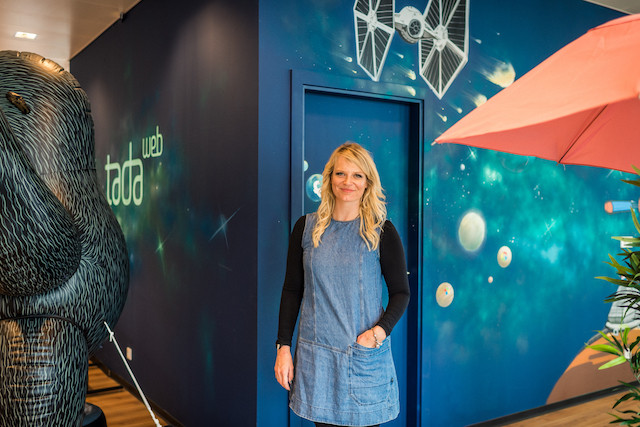The expression refers to the MacGyver-style fixes Kiwis find when encountering problems. In Elvin’s case, the solution was to pitch Tadaweb at the first ICT Spring in Luxembourg, bringing them to the grand duchy.
The number 8 fix is not the only Kiwi value Elvin holds dear. Since starting out in 2011 at the age of 22, the Waiheke island-born tech entrepreneur has brought the best of New Zealand into her life in Luxembourg and vice versa. She bakes every Sunday for staff: “In New Zealand, a big thing that’s important is thanking people with cakes,” she says.
And she gives back. As part of her mission to help young people achieve their potential, Elvin has created a STEM higher education scholarship for a handful of girls in New Zealand. She uses her experience as a young entrepreneur to empower others, speaking at events such as TEDx last year.
Furthermore, as a co-founder of the Australia and New Zealand Chamber of Commerce Luxembourg, Elvin is helping to solve the talent shortage in Luxembourg, among other things. “That’s one of my personal drivers--how to get talent not going to London but to Luxembourg.”
The newly created chamber aims to promote Luxembourg to the two countries as a post-Brexit European hub for business. Elvin sees Luxembourg as an easy sell because of the similarities it shares with New Zealand in terms of size, multiculturalism and complementary activities.
And promoting New Zealand comes naturally to the entrepreneur, who cites the national response to the March 2019 Christchurch mosque shootings as proof of a peaceful, empathetic people. “Within the first 2-3 days, citizens gave over NZ$5m to help the victims and I think the prime minister, Jacinda Ardern, managed to change a horrible and ghastly situation into a showcase on how to lead effectively.”
Elvin is prepared to put in the leg work to bridge the 19,000km between the two countries. Last year, she gave the keynote speech at the CEO New Zealand seminar. “It was strange. It was the first time I’ve ever worked at home. I always go back and lie on the beach,” she laughed. The contacts she made will also serve her when she eventually moves back.
Simon Neale says he wouldn’t be able to play touch at an international level if he was still in New Zealand. Photo: Mike Zenari
A bridge home
For father-of-one and All Blacks fan Simon Neale, landlocked Luxembourg and his home town of Auckland could not be more different. Growing up the son of a lifeguard, he recalls his childhood weekends spent at the beach, body boarding and enjoying the outdoors.
“It’s something that’s maybe a bit harder to do in Luxembourg with the weather,” and the lack of a coastline, he says. Despite these differences, Neale found a little bridge to his home in the touch rugby section of the Rugby Club Luxembourg.
Considered a “softer” version of rugby league with the tackles removed, touch originated in Australia and is taught in schools in New Zealand. But it wasn’t there that Neale caught the touch bug. “At school, I was cricket mad. It was only when I went to university I had a friend keen on rugby who invited me to play touch with his mates,” he says.
Neale did a five-year work stint in Dublin where he began playing touch more seriously and also met his French wife. After a few years in New Zealand, the two moved to Luxembourg in 2015 for her job. With a background in funds, Neale quickly landed work and has even convinced his colleagues to enter teams in the friendly tournaments the club organises.
Today, Neale is a player-coach at a club that boasts an international mix of players, from Kiwis to French, South Africans and Italians. “I think it would be hard adjusting to the lifestyle if I didn’t have touch rugby to give me something to spend my spare time doing,” he says.
He explains that it is part of the Kiwi mentality to “muck in”, which he does in abundance, using his Kiwi can-do attitude to push players to compete in tournaments all over the continent. “Playing touch on an international level, I wouldn’t be able to do that in New Zealand because the standard is a lot higher,” he says, adding: “It’s cool to say I play touch for the national team.”

